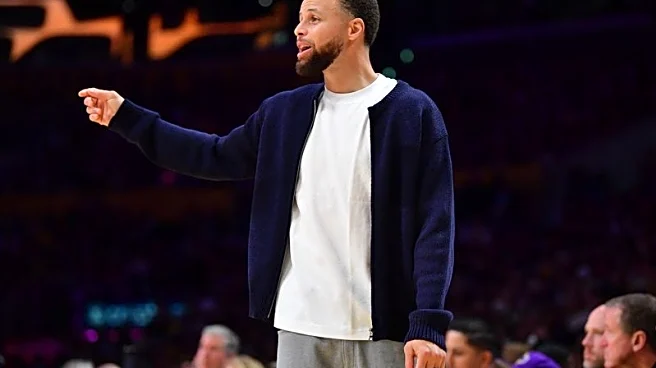What's Happening?
The NBA has unveiled its new TV rights deal, which will significantly expand the coverage of games across various platforms starting in the 2025-26 season. The agreement includes broadcasting on ABC, ESPN, NBC, Peacock, and Amazon Prime, ensuring national coverage every day of the week. Peacock will host a double-header every Monday, while NBC will air two regional games each Tuesday. ESPN will continue its Wednesday night double-header tradition, and Amazon Prime will take over Thursday nights after Thursday Night Football concludes in January. Friday nights will feature double-headers on Amazon Prime, with ESPN occasionally picking up games. ABC will air prime-time games on Saturdays, and Amazon Prime will broadcast daytime games. Sunday games will be aired on NBC once Sunday Night Football wraps up in January. The deal also includes exclusive coverage of the Emirates NBA Cup quarterfinals, semifinals, and championship on Amazon Prime, while Christmas Day games will remain on ABC and ESPN.
Why It's Important?
This new TV rights deal marks a significant shift in how NBA games will be broadcast, potentially increasing accessibility and viewership. By partnering with multiple platforms, the NBA aims to reach a broader audience, leveraging the strengths of traditional networks like ABC and NBC, as well as streaming services like Amazon Prime and Peacock. This diversification could lead to increased revenue for the league and its partners, as well as enhanced fan engagement through varied viewing options. The inclusion of streaming services reflects the growing trend of digital consumption, catering to audiences who prefer on-demand content. The deal also highlights the strategic importance of sports broadcasting in the competitive media landscape, where networks and streaming services vie for exclusive content to attract subscribers.
What's Next?
As the new TV rights deal takes effect, viewers can expect a more dynamic and flexible NBA viewing experience. The league and its broadcasting partners will likely focus on promoting the new schedule and platforms to ensure fans are aware of where and how to watch games. Additionally, the success of this deal could influence future negotiations and partnerships within the sports broadcasting industry, potentially setting a precedent for other leagues seeking to expand their reach through diverse media channels. Stakeholders, including advertisers and sponsors, will be closely monitoring viewership trends and engagement metrics to assess the impact of the expanded coverage.










